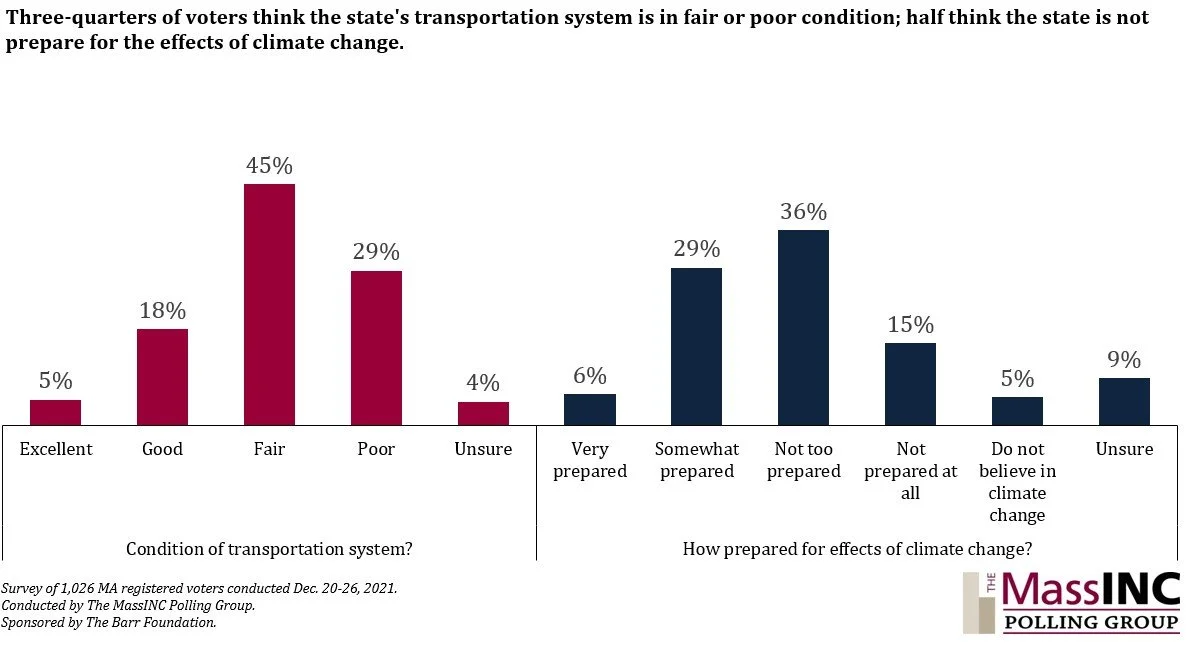Poll: Massachusetts voters support new transportation investment, taxing million-dollar earners
Voters favor shifting the cost of public transportation away from riders.
Looking ahead to the November ballot, 70% of Massachusetts registered voters support the proposed constitutional amendment that would create a 4% surtax on any portion of income over $1 million. Voters also see the need to invest in the state’s transportation system, both to improve conditions and prepare for the effects of climate change. And they favor shifting the cost of public transportation away from riders, with majorities supporting discounts for low-income riders (79%) and even making public transit free for all riders.
Those are the top findings from a new poll of Massachusetts voters conducted by The MassINC Polling Group and sponsored by the Barr Foundation. The poll comes at a time when campaigns for an against the proposed constitutional amendment are gearing up, and as some cities and transit agencies are continuing or expanding pilot programs to make bus service free.
Boston Mayor Michelle Wu is seeking to expand a fare-free pilot on the MBTA’s Route 28 bus to include two other lines that run through some of the lowest-income neighborhoods in the city. Making buses free in low-income neighborhoods was the most popular type of free transit included in the poll, with 71% of voters in favor. Smaller majorities supported removing fares from all buses (61%), the MBTA subways (58%), and the commuter rail and ferries (53%).
“For years, public transit has been expected to pay for itself in a way that other government services, including other modes of transportation, have not,” said Richard Parr, Research Director at The MassINC Polling group. “These numbers show that voters are open to shifting to a new approach to paying for transit.”
Transit funding is not the only aspect of transportation in the state that voters think requires attention. Three-quarters of voters think the state’s transportation system is only fair (45%) or poor (29%) condition. And half of voters think the state is either not too (36%) or not at all prepared for the effects of climate change (15%).
Improving system conditions and protecting against climate, all while making transit more affordable, will require more government spending. For that, voters seem to have their eyes on high earners to help pay for it all. The 70% in favor of the so-called millionaire’s tax amendment is virtually identical to the support levels found in a voter poll MPG conducted a year prior, in December 2020.
The constitutional amendment would earmark the revenue collected for education and transportation. If it passes, a plurality (39%) would like to see the revenue collected split evenly between transportation and education; 19% would prefer more to go to transportation; and 26% would want education to receive more.
Some other findings from the poll:
Less than half of voters (47%) think the state is headed in the right direction, and 36% think it is off on the wrong track. There is a strong partisan split on this question, with 66% of Democrats thinking the state is headed in the right direction, 61% of Republicans think it is off on the wrong track, and Independents split evenly.
Apart from COVID, economic issues are a rising concern among voters: 18% named jobs and the economy as the single biggest issue facing the state other than the pandemic. Another 7% cited inflation or the cost of living, 9% cited housing costs, and 7% named poverty, homelessness, or income inequality.
Transit usage remains below pre-COVID levels. MPG polls have consistently shown broad swaths of the workforce spending at least part of each week working remotely. That continues today, with 37% of workers continuing to work from home at least a few times a week.
About the Poll
These results are based on a survey of 1,026 Massachusetts registered voters. Voters were contacted between December 20-26, 2021 via online survey interviewing. The final data were weighted by known and estimated demographics for registered voters statewide by age and gender, race, education level, geography, and political party identification. The poll was sponsored by The Barr Foundation.


